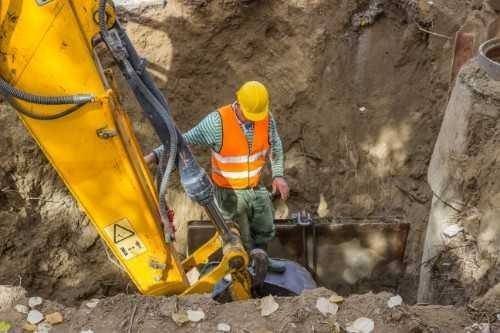Excavation and trenching are essential activities in the construction industry, but they come with inherent risks. Accidents related to excavation and trenching can be catastrophic, resulting in severe injuries or even fatalities. As a responsible construction firm, Chavez Law Firm aims to raise awareness about the dangers associated with these activities and highlight the necessary safety requirements that contractors in Texas must follow to prevent accidents and protect their workers.
The Hazards of Excavation and Trenching:
Excavation and trenching involve digging into the ground to create foundations, lay pipelines, or install utilities. While these tasks are crucial, they also pose significant risks due to various factors:
- Cave-ins: One of the most significant dangers associated with excavation and trenching is the risk of a collapse. The walls of an excavation or trench can quickly give way, burying workers under tons of soil and debris. Cave-ins often occur due to improper shoring, soil instability, or adverse weather conditions.
- Falls and Slips: Workers can fall into trenches or excavations if they are not adequately protected. The depth of a trench, coupled with insufficient barriers or guardrails, increases the likelihood of accidental falls. Slips within the trench can also occur due to wet or uneven surfaces, leading to serious injuries.
- Engulfment: Excavations can contain hazardous materials, such as water, gas, or chemicals. Workers can be at risk of drowning, asphyxiation, or exposure to harmful substances if proper precautions are not taken.
- Falling Objects: Construction sites are often bustling with activity, which means there is a risk of objects falling into an open excavation or trench. Heavy machinery, tools, or materials that are not adequately secured can pose a threat to the workers below.
Safety Requirements in Texas:
Recognizing the potential dangers associated with excavation and trenching, the state of Texas has implemented stringent safety regulations to protect workers in the construction industry. Contractors and employers must adhere to these guidelines to ensure a safe working environment. Some key requirements include:
- Competent Person: The Occupational Safety and Health Administration (OSHA) mandates that a competent person must be present on-site to oversee excavation and trenching operations. This individual should possess the knowledge and expertise to identify hazards, implement safety measures, and respond promptly in case of emergencies.
- Protective Systems: Employers must use appropriate protective systems to prevent cave-ins. These systems include shoring, sloping, or shielding techniques that provide stability to the excavation or trench walls. The type of soil and the depth of the excavation determine the necessary protective measures.
- Access and Egress: Safe entry and exit points are crucial in case of emergencies. Workers should have easy access to ladders, stairways, or ramps when entering or leaving excavations or trenches. These access points must be located within close proximity to workers and positioned in a manner that ensures their safety.
- Hazardous Atmospheres: Employers must regularly test excavations and trenches for the presence of hazardous gases or low oxygen levels. Adequate ventilation and air monitoring systems should be implemented to prevent accidents related to hazardous atmospheres.
- Training and Communication: It is the responsibility of the employer to provide comprehensive training to workers involved in excavation and trenching activities. Employees should receive instruction on recognizing hazards, implementing safety measures, and understanding emergency procedures. Effective communication channels should also be established to keep workers informed about any potential risks or changes in safety protocols.
The Importance of Regular Inspections:
In addition to complying with safety requirements, regular inspections are crucial for identifying potential hazards and ensuring the integrity of excavation and trenching sites. These inspections should be conducted by competent individuals who are trained to recognize signs of instability, soil erosion, or other risks that may compromise the safety of workers.
Inspections should also include a thorough examination of the protective systems, access points, and safety equipment. Any deficiencies or issues should be addressed promptly to minimize the risk of accidents and injuries.
Emergency Preparedness:
Even with proper safety measures in place, accidents can still happen. That is why it is essential to have a robust emergency preparedness plan. Contractors and employers should establish clear protocols for responding to emergencies such as cave-ins, falls, or hazardous substance exposure.
The plan should outline procedures for evacuating workers, contacting emergency services, and providing immediate medical assistance. Regular drills and simulations can help familiarize workers with the emergency procedures, ensuring a swift and coordinated response in case of an incident.
Worker Empowerment and Reporting:
Creating a culture of safety requires active involvement from the workers themselves. Employees should be encouraged to report any unsafe conditions, near misses, or potential hazards they observe on the construction site. Timely reporting allows for prompt corrective action, preventing accidents before they occur.
Additionally, workers should feel empowered to speak up about any concerns they have regarding excavation and trenching operations. Their input can contribute to identifying potential risks and improving safety measures.
Collaboration within the Industry:
Ensuring the safety of excavation and trenching activities requires collaboration among contractors, employers, regulatory agencies, and industry organizations. Sharing best practices, lessons learned, and new safety technologies can help enhance safety standards and reduce accidents.
Participation in industry associations, safety seminars, and workshops can provide valuable insights and networking opportunities to stay up-to-date with the latest safety trends and advancements.
At Chavez Law Firm, we recognize the importance of maintaining a safe work environment in the construction industry. If you are a contractor or employer in Texas involved in excavation and trenching activities, it is crucial to prioritize the safety of your workers. Familiarize yourself with the safety requirements, ensure compliance, and invest in regular training and education to prevent accidents and protect lives.
For experienced legal advice or assistance regarding construction-related matters, including excavation and trenching accidents, contact Chavez Law Firm today. Our experienced team is dedicated to helping you navigate through complex legal issues and advocating for your rights.
